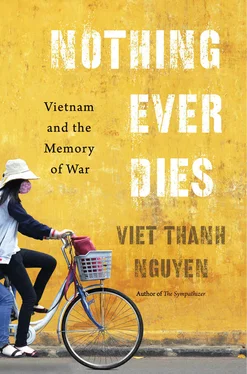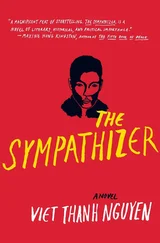10. Hwang, The Shadow of Arms , 65.
11. Ibid., 66.
12. Park, “Narratives of the Vietnam War by Korean and American Writers,” 76.
13. Hwang, The Shadow of Arms , 137.
14. As both Moon ( Militarized Modernity and Gendered Citizenship in South Korea ) and Choi (“The Discourse of Decolonization and Popular Memory”) argue in different ways, South Koreans have an ambivalent relationship to the West and what it represents. For Moon, the South Korean embrace of Western modernity is tinged with an awareness that Western modernity is a legacy of colonialism. Choi argues that South Korea still suffers from a neocolonial relationship with the United States. This ambivalence about being formerly colonized, but implicated in helping the United States colonize or dominate other countries, helps shape Korean attitudes toward the Vietnamese.
15. Hwang, The Shadow of Arms , 41.
16. Ibid., 399.
17. Ibid., 46.
18. See Ryu (“Korea’s Vietnam,” 106) for the full lyrics and for an account of the song’s popularity and the eventual movie based on it. Kwon ( After the Massacre , vii) affirms the song’s popularity, recounting how he sang the song as a youngster during wartime. In popular cultural accounts circulating within Korea after the war, the Korean veteran of the war is featured in “proud, boastful reproductions of the legendary ROK,” or Republic of Korean soldier (Ryu, “Korea’s Vietnam,” 102). Perhaps this is not surprising, given how the Korean public did not oppose the war and, according to Moon, did not participate in the global movement against the war that was strong even in nearby Japan. Instead, that public was subject to the Korean state’s efforts at “mass mobilization and propaganda,” whereby “students were exhorted to send comfort letters and comfort goods to Korean soldiers serving in Vietnam. The mass media produced a plethora of images and stories supporting the everyday mythology of brave and ferocious Korean soldiers fighting in the war” ( Militarized Modernity and Gendered Citizenship in South Korea , 26).
19. Hwang, The Shadow of Arms , 67.
20. The presence of soldier and prostitute are evidence of what Lee calls “sexual proletarianization,” where Korea encouraged poor rural men to volunteer for Vietnam as “military labor” and poor women to export themselves as sexual labor (“Surrogate Military, Subimperialism, and Masculinity,” 656). Hwang mentions Korean soldiers sending appliances home on p. 239 of The Shadow of Arms .
21. On Korean attitudes toward whiteness and blackness, and how those have been shaped by the United States and its military presence in South Korea, see Kim, Imperial Citizens .
22. Armstrong accounts for the movie’s Korean title of White War ( Hayan chonjaeng ) in “America’s Korea, Korea’s Vietnam,” 539n22.
23. Ahn, White Badge , 289.
24. Ibid., 40.
25. See Cumings (“The Northeast Asian Political Economy”), Woo ( Race to the Swift , 45–117), and Woo-Cumings (“Market Dependency in U.S. — East Asian Relations”) for the details of the Korean economy’s relationship to the Republic of Vietnam during the war and the consequences of the relationship for Korea’s rise.
26. Ahn, White Badge , 40.
27. Ibid., 155.
28. Ibid., 69. “Hungry and poor, they were eager to prove their masculinity,” says Lee. The Korean soldiers became miniaturized versions of Americans, “vengefully mimetic and reiterative” (“Surrogate Military, Subimperialism, and Masculinity,” 663–64).
29. Ahn, White Badge , 154.
30. Ibid., 155.
31. Ibid., 78.
32. Ibid., 278.
33. Ibid., 314.
34. Ibid., 155.
35. Cumings, “The Northeast Asian Political Economy,” 129.
36. For a detailed reading of the novel and its film adaptation, see Williams, “From Novel to Film.”
37. See the essays in Stringer’s New Korean Cinema for more on this topic.
38. Jeffords, The Remasculinization of America , and Kim, The Remasculinization of Korean Cinema .
39. As Ryu argues, the vengeful female ghost exists as a sign of what Koreans continue to find unthinkable, the fact that Korean soldiers, as implied in the movie, carried out “unspeakable tales of gendered violence” that included “an entire range of sexual activity from rape to prostitution to abandonment of Vietnamese common-law wives and children that formed the off-the-battlefield reality for so many soldiers” (“Korea’s Vietnam,” 111).
40. The theme of ghosts, haunting, and trauma surface also in a South Korean musical about the Vietnam War, Blue Saigon , which was performed in 2002 at the National Theater in Seoul and was presumably known by the makers of R-Point . The musical follows the sole survivor of a Korean unit, Sergeant Kim, as he lies dying in contemporary Korea of illness brought on by American-sprayed Agent Orange (another reference to the black-faced Sergeant Kim of popular song). Sergeant Kim’s daughter is also disabled by the effects of Agent Orange on her father, while his half-son from a Vietnamese bar hostess and Viet Cong agent has finally come to visit Korea, where he is disillusioned by what he finds. As Sergeant Kim lies dying, a ghostly woman appears by his bedside, singing “Blue Saigon.” In many ways, then, Blue Saigon occupies the same territory of memory as the other works mentioned here. For the summary of the musical and the intentions of its producers, see Kirk, “Confronting Korea’s Agony in Vietnam.”
41. The motif of “friendly fire” is prevalent in American memories of the war, as Kinney shows in Friendly Fire . Korean movies about the war evoke these Hollywood themes for the same purpose, to make the war about Koreans rather than Vietnamese.
42. Jager and Jiyul in “The Korean War after the Cold War,” 234, describe this claim.
43. In Vietnamese, the part about Korean soldiers calls them “Park Chung Hee’s mercenaries” ( bọn lính dánh thuê Pắc Chung Hy ).
44. Ky writes that “many South Korean and Thai volunteers … bought cheap appliances in American PXes and either shipped them home to be sold on the black market or sold them to a Vietnamese for triple their cost. But these men … were poor and underpaid, and I understood from personal experience why they did wrong” ( Buddha’s Child , 164).
45. Brigham, ARVN: Life and Death in the South Vietnamese Army , 60.
46. Michèle Ray’s segment from the omnibus antiwar film Loin du Vietnam (Far from Vietnam, directed by Joris Ivens et al.) discusses how the “Vietnamese don’t like and fear these Koreans” (at the 1 hour and 11 minute mark).
47. Hayslip, When Heaven and Earth Changed Places ,198.
48. Kwon, After the Massacre , 29.
49. Ryu calls the song a “mega-hit” (“Korea’s Vietnam,” 104).
50. On how memories of Korean soldiers and their actions affect postwar relations between Vietnamese civilians and the Vietnamese state, see Kwon’s After the Massacre .
51. King, “Address at the Fourth Annual Institute of Nonviolence and Social Change at Bethel Baptist Church,” 338.
52. Ibid., 339.
53. For the Korean American perspective on the Los Angeles rebellion, and an account of the death of the lone Korean American, see the documentary Sa-I-Gu .
54. I owe great thanks to Heonik Kwon for providing me with the directions to the memorial. His work on the memorial in After the Massacre informs much of my discussion of the memorial, as does Kim’s “Korea’s ‘Vietnam Question.’ ”
Читать дальше












